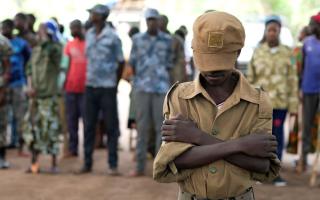Strategic Foresight for Prevention
This four-week course will allow participants to familiarize themselves with strategic foresight and analytical tools, methodologies and design processes necessary to conduct informed analysis for conflict prevention and sustaining peace. The course will combine self-paced modules with live weekly webinars, giving participants the opportunity to interact with each other and the tutor and share experiences and learnings from across United Nations entities and key partners.
The New Agenda for Peace, the twin resolutions on Sustaining Peace, and the 2030 Agenda for Sustainable Development represent system-wide frameworks that place prevention as a key priority and shared responsibility for the United Nations. The concept of Sustaining Peace, in particular, puts emphasis on a continuum of preventive actions that cut across all pillars and workstreams of the UN system, from humanitarian action and peacekeeping to peacebuilding and sustainable development. Preventing the outbreak, escalation, continuation and recurrence of conflicts is a hugely ambitious task, but a more forward-looking, integrated, strategic and coherent approach across and beyond the UN system can lead to the achievement of a sustained peace.
Every day, the UN is called to take decisions whose impact will affect the lives of millions of people who are the direct beneficiaries of our collective work as international civil servants. In today’s fast-evolving world, foresight is increasingly recognized as an organizational capacity that the UN system can use to gather and process information about the future operating environment and make informed and more effective decisions. Building on the UN 2.0 and the New Agenda for Peace, the programme will help participants develop key knowledge and skills to navigate uncertainty and embody the change needed to adapt to new peace-and-security risks and opportunities. It will offer a joint space for experiential learning, promoting open-mindedness, adaptability, and innovation across the UN system.
Upon successful completion of this programme, you will be able to:
- Understand key concepts related to strategic foresight for prevention as relevant to the UN prevention agenda
- Apply strategic foresight techniques and methodologies, including horizon scanning, future wheels, futures triangle, risk and threat assessment, as well as scenario building to better respond to strategic risks to peace
- Strengthen an anticipatory mindset for thinking and acting more systematically long-term, thus dealing more effectively with uncertainty
- Analyse results to inform decision-making and strategic planning for early warning and conflict prevention
UNSSC online courses are designed to deliver maximum learning outcomes through carefully chosen high-quality learning materials. Our facilitated online courses combine self-paced study modules with applied learning components, such as case studies and interactive exercises tailored to the needs of the professional interested in deepening their knowledge on a particular subject matter.
Participants will benefit from live moderated webinars, which feature valuable input from renowned subject matter experts and allow real-time dialogue with high-level speakers. Webinar recordings are made available to ensure that participants have a flexible and seamless learning experience.
An expert facilitator guides and assists participants throughout the course and provides real-time feedback on activities and exercises. Our user-friendly social online learning platform provides participants with the opportunity to connect with peers from diverse organizational backgrounds, fostering peer-to-peer learning.
UNSSC online courses give learners the opportunity to complete activities when it best fits their schedule. Participants are largely free to determine their own weekly study plan. Lasting four weeks and demanding three hours of study per week, UNSSC online courses incorporate the same high academic rigour as any UNSSC face-to-face programme.
Week 1, (18th September, 15h00-17h00 pm CEST) : Foundations of Foresight for Prevention
Week 2 (25th September from 15h00-17h00 CEST) : Rethinking the Present to Imagine and Influence Alternative Futures – Tools and Techniques
Week 3 ( 2nd October from 15h00-17h00 CEST): How Do YOU Imagine Possible Futures? Overcoming Assumptions and Dealing with Uncertainty
Week 4 (9th October from 15h00-17h00 CEST): Building Organizational Capacity for Prevention through Foresight – integrating your analysis into joint strategic planning and decision-making
United Nations staff from the Secretariat, agencies, funds and programmes and partners working on prevention through political, context and situational analysis, good offices, mediation and conflict-sensitive programming.
$1000
Photo: Pasqual Gorriz/UN






